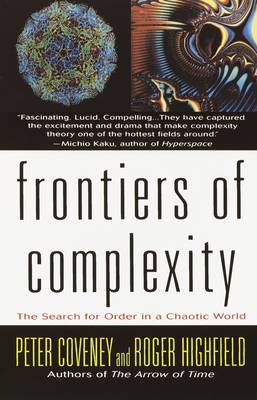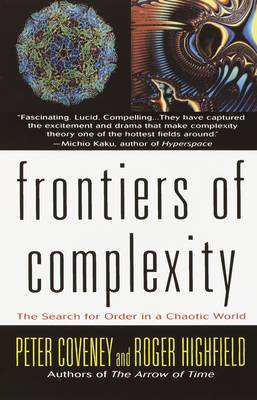
Je cadeautjes zeker op tijd in huis hebben voor de feestdagen? Kom langs in onze winkels en vind het perfecte geschenk!
- Afhalen na 1 uur in een winkel met voorraad
- Gratis thuislevering in België vanaf € 30
- Ruim aanbod met 7 miljoen producten
Je cadeautjes zeker op tijd in huis hebben voor de feestdagen? Kom langs in onze winkels en vind het perfecte geschenk!
- Afhalen na 1 uur in een winkel met voorraad
- Gratis thuislevering in België vanaf € 30
- Ruim aanbod met 7 miljoen producten
Zoeken
Frontiers of Complexity
The Search for Order in a Choatic World
Peter Coveney, Roger Highfield
Paperback | Engels
€ 34,45
+ 68 punten
Omschrijving
"SCIENCE JOURNALISM AT ITS BEST. . . An impeccably researched, amazingly up-to-date, crisply written and well-illustrated survey."
--Nature
At the cutting edge of the sciences, a dynamic new concept is emerging: complexity. In this groundbreaking new book, Peter Coveney and Roger Highfield explore how complexity in mathematics, physics, biology, chemistry, and even the social sciences is transforming not only the way we think about the universe, but also the very assumptions that underlie conventional science.
Complexity is a watchword for a new way of thinking about the behavior of interacting units, whether they are atoms, ants in a colony, or neurons firing in a human brain. The rise of the electronic computer provided both the key and the catalyst to our exploration of complexity.
A new generation of computers that runs on light and exploits the bizarre properties of quantum mechanics promises to deepen our understanding still further. The advances we have already witnessed are spectacular. The authors take us inside laboratories where scientists are evolving the genetic molecules that enabled life to emerge on earth and generating universes teeming with virtual creatures in cyber-space. We witness the utterly realistic behavior of a school of virtual fish--computer-generated replicas that have been trained to swim gracefully, hunt for food, and scatter at the approach of a leopard shark.
Compelling in its clarity, far-reaching in its implications, vibrant with the excitement of new discovery, Frontiers of Complexity is an arresting account of how far science has come in the past fifty years and an essential guide to the rapidly approaching future.
"[A] MARVELOUS AND COMPREHENSIVE WORK . . . Virtually any scientist or interested lay reader will find this book engrossing, edifying and inspiring."
--Publishers Weekly (starred review)
--Nature
At the cutting edge of the sciences, a dynamic new concept is emerging: complexity. In this groundbreaking new book, Peter Coveney and Roger Highfield explore how complexity in mathematics, physics, biology, chemistry, and even the social sciences is transforming not only the way we think about the universe, but also the very assumptions that underlie conventional science.
Complexity is a watchword for a new way of thinking about the behavior of interacting units, whether they are atoms, ants in a colony, or neurons firing in a human brain. The rise of the electronic computer provided both the key and the catalyst to our exploration of complexity.
A new generation of computers that runs on light and exploits the bizarre properties of quantum mechanics promises to deepen our understanding still further. The advances we have already witnessed are spectacular. The authors take us inside laboratories where scientists are evolving the genetic molecules that enabled life to emerge on earth and generating universes teeming with virtual creatures in cyber-space. We witness the utterly realistic behavior of a school of virtual fish--computer-generated replicas that have been trained to swim gracefully, hunt for food, and scatter at the approach of a leopard shark.
Compelling in its clarity, far-reaching in its implications, vibrant with the excitement of new discovery, Frontiers of Complexity is an arresting account of how far science has come in the past fifty years and an essential guide to the rapidly approaching future.
"[A] MARVELOUS AND COMPREHENSIVE WORK . . . Virtually any scientist or interested lay reader will find this book engrossing, edifying and inspiring."
--Publishers Weekly (starred review)
Specificaties
Betrokkenen
- Auteur(s):
- Uitgeverij:
Inhoud
- Aantal bladzijden:
- 480
- Taal:
- Engels
Eigenschappen
- Productcode (EAN):
- 9780449910818
- Verschijningsdatum:
- 27/08/1996
- Uitvoering:
- Paperback
- Formaat:
- Trade paperback (VS)
- Afmetingen:
- 140 mm x 216 mm
- Gewicht:
- 498 g

Alleen bij Standaard Boekhandel
+ 68 punten op je klantenkaart van Standaard Boekhandel
Beoordelingen
We publiceren alleen reviews die voldoen aan de voorwaarden voor reviews. Bekijk onze voorwaarden voor reviews.









